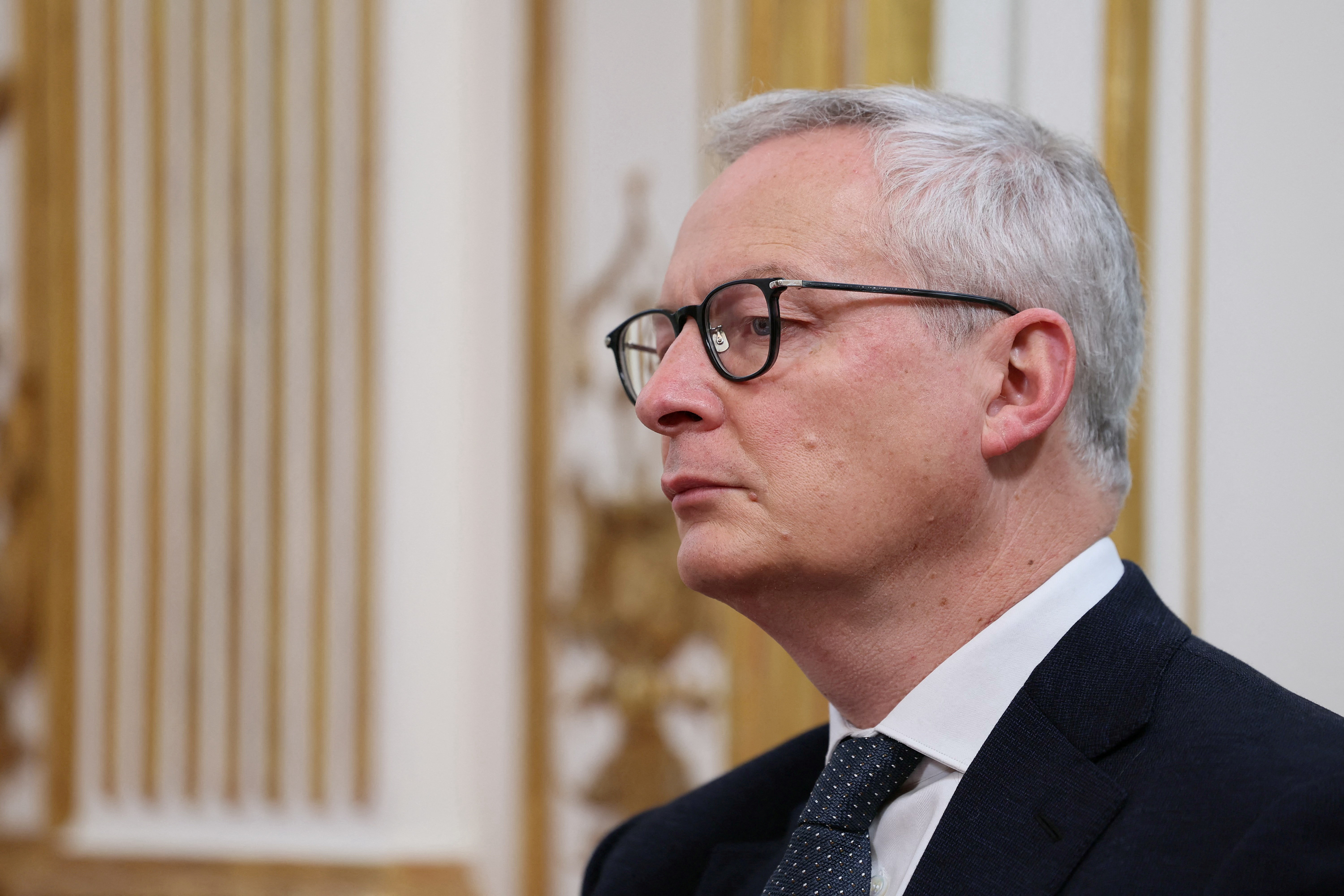France proposed on Friday the creation of a “European savings product” with the EU states that wish it, in order to mobilize private capital in the service of growth, an idea immediately rejected by Germany. This product would aim to better direct the savings of EU citizens towards the long-term financing of businesses, using attractive taxation. It could, for example, take the form of a European retirement savings plan (PER), the French Ministry of Finance explains.
“Let us launch a European savings product in 2024, the characteristics of which we will define, the yield, with the voluntary states,” proposed the French Minister of Finance Bruno Le Maire, before a meeting with his counterparts from the Twenty-Seven in Ghent (Belgium). ). According to him, a handful of countries could initially participate in this initiative to build a capital markets union in Europe, a sea serpent of European summits.
“It might be 2, 3, 4, 5 states, whatever. But as it is impossible to start immediately with 27, let’s start with a few,” said Bruno Le Maire, without specifying which these voluntary states could be. The European Union suffers from the fragmentation of its capital markets, divided between the different member countries. The capitalization of European stock markets is four times lower than that of American markets. The EU has been discussing proposals for years to benefit from scale effects comparable to the United States. But these debates stumble over divergent national interests.
“There is a lot of impatience in me (...). I am not coming to Ghent to meet my Finance Minister friends to have a chat,” said Bruno Le Maire. “I am not coming to publish the 10th, 15th or 20th press release on the Capital Markets Union in which there is nothing or almost nothing.” Efficient markets make it easier for companies to finance their projects and for individuals to find better investment deals.
There is certainly already a pan-European savings product, created in 2019, the PEPP (Pan European Personal Pension Product), but its distribution faces pricing and taxation that is not harmonized from one Member State to another. The German Minister of Finance, Christian Lindner, however, rejected the French initiative in Ghent.
France and Germany recently signed a joint forum to relaunch the capital markets union project, recalled Bruno Le Maire, “but it’s good when actions match words,” he joked. . “I plead for a union not at several speeds, as my friend Bruno says, but at full speed, that is to say one which advances quickly with the 27”, replied Christian Lindner. “It is not excluded that bilateral or small committee initiatives are also possible, but the objective must be to move forward together,” he said.
Bruno Le Maire also proposed to EU asset managers, banks and stock exchanges “voluntary European supervision” which could be exercised by the European Securities and Markets Authority (ESMA) based in Paris. He also put on the table a “guarantee for securitization” project, so that “securities stop weighing on the balance sheets of banks” and so that they can “lend more to individuals and businesses”.
“Europeans' money is sleeping instead of working,” said the minister. “If we want European money to work instead of sleeping, the Capital Markets Union must be put in place without delay and there must be progress from 2024.” He estimated the savings of Europeans at some 35,000 billion euros, of which “more than 10,000 billion are sitting in bank accounts”, or a third of the total, compared to less than 15% in the United States.
“We have a decisive battle ahead of us, that is growth,” he said, referring to the EU's disconnection from the United States. “No one can accept that European growth is one point below American growth.” The GDP of the euro zone was equivalent to that of the United States in 2008, but 15 years later, it is 20% lower.

 What is chloropicrin, the chemical agent that Washington accuses Moscow of using in Ukraine?
What is chloropicrin, the chemical agent that Washington accuses Moscow of using in Ukraine? Poland, big winner of European enlargement
Poland, big winner of European enlargement In Israel, step-by-step negotiations for a ceasefire in the Gaza Strip
In Israel, step-by-step negotiations for a ceasefire in the Gaza Strip BBVA ADRs fall almost 2% on Wall Street
BBVA ADRs fall almost 2% on Wall Street Children born thanks to PMA do not have more cancers than others
Children born thanks to PMA do not have more cancers than others Breast cancer: less than one in two French women follow screening recommendations
Breast cancer: less than one in two French women follow screening recommendations “Dazzling” symptoms, 5,000 deaths per year, non-existent vaccine... What is Lassa fever, a case of which has been identified in Île-de-France?
“Dazzling” symptoms, 5,000 deaths per year, non-existent vaccine... What is Lassa fever, a case of which has been identified in Île-de-France? Sánchez cancels his agenda and considers resigning: "I need to stop and reflect"
Sánchez cancels his agenda and considers resigning: "I need to stop and reflect" “Amazon product tester”: the gendarmerie warns of this new kind of scam
“Amazon product tester”: the gendarmerie warns of this new kind of scam “Unjustified allegations”, “promotion of illicit products”… Half of the influencers controlled in 2023 caught by fraud repression
“Unjustified allegations”, “promotion of illicit products”… Half of the influencers controlled in 2023 caught by fraud repression Extension of the RER E: Gabriel Attal welcomes a “popular” ecology project
Extension of the RER E: Gabriel Attal welcomes a “popular” ecology project WeWork will close 8 of its 20 shared offices in France
WeWork will close 8 of its 20 shared offices in France “We were robbed of this dignity”: Paul Auster’s wife denounces the betrayal of a family friend
“We were robbed of this dignity”: Paul Auster’s wife denounces the betrayal of a family friend A masterclass for parents to fill in their gaps before Taylor Swift concerts
A masterclass for parents to fill in their gaps before Taylor Swift concerts Jean Reno publishes his first novel Emma on May 16
Jean Reno publishes his first novel Emma on May 16 Cannes Film Festival: Meryl Streep awarded an honorary Palme d’Or
Cannes Film Festival: Meryl Streep awarded an honorary Palme d’Or Omoda 7, another Chinese car that could be manufactured in Spain
Omoda 7, another Chinese car that could be manufactured in Spain BYD chooses CA Auto Bank as financial partner in Spain
BYD chooses CA Auto Bank as financial partner in Spain Tesla and Baidu sign key agreement to boost development of autonomous driving
Tesla and Baidu sign key agreement to boost development of autonomous driving Skoda Kodiaq 2024: a 'beast' plug-in hybrid SUV
Skoda Kodiaq 2024: a 'beast' plug-in hybrid SUV The home mortgage firm rises 3.8% in February and the average interest moderates to 3.33%
The home mortgage firm rises 3.8% in February and the average interest moderates to 3.33% This is how housing prices have changed in Spain in the last decade
This is how housing prices have changed in Spain in the last decade The home mortgage firm drops 10% in January and interest soars to 3.46%
The home mortgage firm drops 10% in January and interest soars to 3.46% The jewel of the Rocío de Nagüeles urbanization: a dream villa in Marbella
The jewel of the Rocío de Nagüeles urbanization: a dream villa in Marbella Europeans: a senior official on the National Rally list
Europeans: a senior official on the National Rally list Blockade of Sciences Po: the right denounces a “drift”, the government charges the rebels
Blockade of Sciences Po: the right denounces a “drift”, the government charges the rebels Even on a mission for NATO, the Charles-de-Gaulle remains under French control, Lecornu responds to Mélenchon
Even on a mission for NATO, the Charles-de-Gaulle remains under French control, Lecornu responds to Mélenchon “Deadly Europe”, “economic decline”, immigration… What to remember from Emmanuel Macron’s speech at the Sorbonne
“Deadly Europe”, “economic decline”, immigration… What to remember from Emmanuel Macron’s speech at the Sorbonne These French cities that will boycott the World Cup in Qatar
These French cities that will boycott the World Cup in Qatar Champions Cup: Toulouse with Flament and Kinghorn against Harlequins, Ramos replacing
Champions Cup: Toulouse with Flament and Kinghorn against Harlequins, Ramos replacing Tennis: still injured in the arm, Alcaraz withdraws from the Masters 1000 in Rome
Tennis: still injured in the arm, Alcaraz withdraws from the Masters 1000 in Rome Sailing: “Like a house that threatens to collapse”, Clarisse Crémer exhausted and in tears aboard her damaged boat
Sailing: “Like a house that threatens to collapse”, Clarisse Crémer exhausted and in tears aboard her damaged boat NBA: Patrick Beverley loses his temper and throws balls at Pacers fans
NBA: Patrick Beverley loses his temper and throws balls at Pacers fans


















